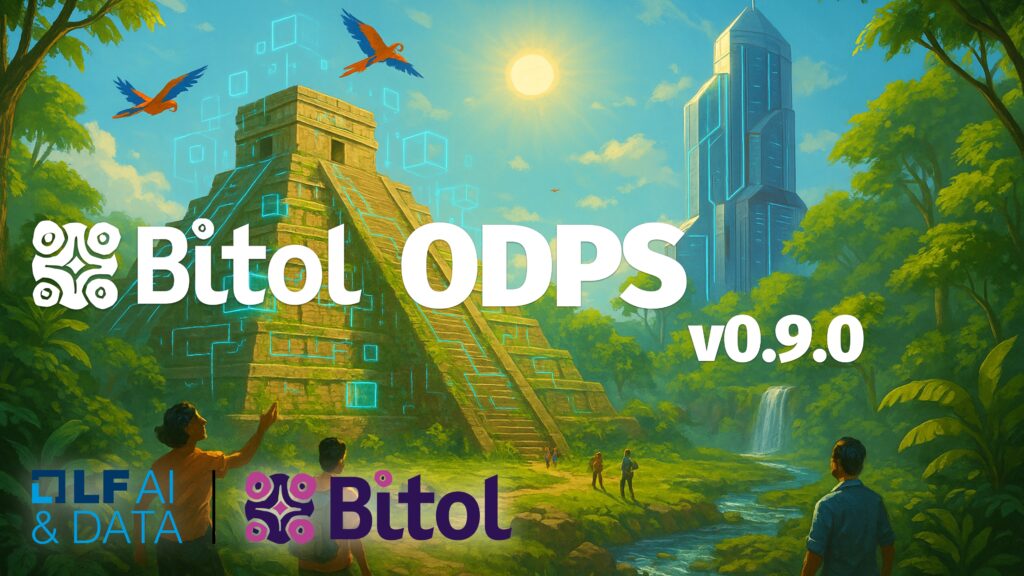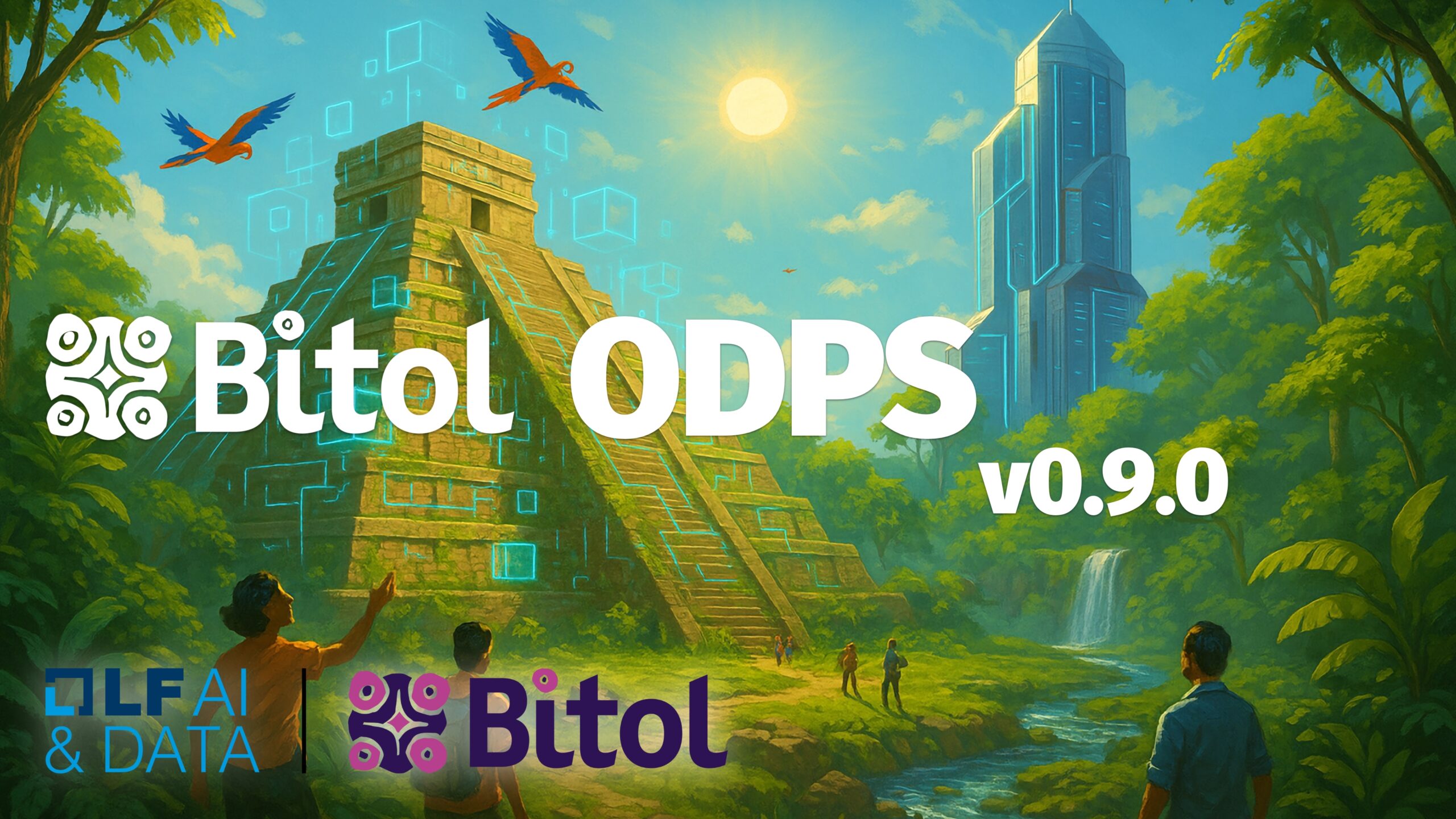Dear community,
As Chair of the Technical Steering Committee (TSC) at Bitol, I’m proud to announce the release of ODPS (Open Data Product Standard) v0.9.0 — the latest milestone in our journey toward defining and operationalizing data products at scale through open standards.
The Open Data Product Standard (ODPS) enables organizations to describe, publish, and manage data products with clarity, consistency, and confidence. Version 0.9.0 reflects months of deep collaboration and brings us closer to the first stable 1.0 release.

Announcing ODPS v0.9.0
What is a data product?
It might be useful to align on the community definition, now in Wikipedia:
A data product is a reusable, active, and standardized data asset designed to deliver measurable value to its users, whether internal or external, by applying the rigorous principles of product thinking and management. It comprises one or more data artifacts (e.g., datasets, models, pipelines) and is enriched with metadata, including governance policies, data quality rules, data contracts, and, where applicable, a Software Bill of Materials (SBOM) to document its dependencies and components. Ownership of a data product is aligned to a specific domain or use case, ensuring accountability, stewardship, and its continuous evolution throughout its lifecycle. Adhering to the FAIR principles — Findable, Accessible, Interoperable, and Reusable — a data product is designed to be discoverable, scalable, reusable, and aligned with both business and regulatory standards, driving innovation and efficiency in modern data ecosystems.
ODPS fully embraces and operationalizes this definition. For SBOMs, ODPS currently recommends a bring-your-own approach, such as the SPDX format from the Linux Foundation: https://spdx.dev.
ODPS Enforces Product Thinking for Data Products
ODPS wasn’t born out of boredom—it emerged because stitching together twenty half-standards, three wikis, and a tribal Slack thread doesn’t magically turn a dataset into a product. While other specs handled metadata, APIs, or governance in isolation, none tackled the messy, glorious, full-stack reality of data products: ownership, lifecycle, delivery, and reuse. ODPS brings it all together with just enough opinion to be useful, without pretending your platform is Google. Crucially, it aligns tightly with ODCS, the Open Data Contract Standard, creating a powerful duo where contracts define the promise and ODPS defines the product. It also marks a key milestone on the Bitol roadmap, bringing us one step closer to a unified, open, and interoperable ecosystem for data delivery at scale.
ODCS is powerful on its own—you don’t need a full data product to benefit from well-defined data contracts. But ODPS brings those contracts together into something greater: a discoverable, governed, and evolving data product. And it is finally here.
— Dr. Simon Harrer, Member of the TSC, Bitol and Co-Founder and CEO, Entropy Data
What’s New in ODPS v0.9.0?
Here are the highlights of ODPS:
- Refined Data Product Structure: We’ve introduced more apparent separation between metadata, contracts, and delivery mechanisms, aligning better with real-world platform implementations.
- Improved Modeling of Product Relationships: Products can now reference others via contracts, supporting real-world relationships such as dependencies, derivations, or bundles, without requiring the enforcement of implementation-specific logic.
- Governance and Lifecycle Support: Version 0.9.0 introduces explicit lifecycle states (draft, deprecated, retired, etc.) and governance checkpoints to enhance support for federated governance models.
- Aligned with ODCS: Full alignment with the Open Data Contract Standard (ODCS) enables ODPS-based products to embed contract information natively, promoting trust and accountability while maintaining a similar structure & philosophy.
- Early Vendor Adoption: Several organizations, including Data Mesh Manager, Actian, and Quantyca, among others, are already aligning their platforms and tooling with ODPS.
- JSON Schema v2020-12 Foundation: We’ve updated our schema backbone for more expressive validation, improved compatibility, and enhanced tool support (in a very early stage).
Documentation & Examples
The full specification and examples can be found here: https://github.com/bitol-io/open-data-product-standard/tree/main/docs.
With Gratitude
This release is the result of dedicated work by the Bitol Technical Steering Committee: Andrea Gioia, Andrew Jones, Andy Petrella, Atanas Iliev, Christian Foyer, Diego Carvallo, Dirk Van de Poel, Gene Stakhov, Jean-Georges (jgp) Perrin (Chair), Jochen Christ, Manuel Destouesse, Martin Meermeyer, Peter Flook, and Simon Harrer.
And a warm thank-you to early contributors and reviewers outside the TSC whose insights helped shape this version, in particular:
Tom de Wolf, Praveen Guduri, Denis Arnaud, and many others across our community Slack, GitHub discussions, and vendor calls.
Join the Conversation
The community shapes ODPS (and ODCS) — you. If you’re building data platforms, enabling federated governance, or designing internal data marketplaces, ODPS is built for you.
You can:
- Join the discussion on Slack: https://jgp.ai/dmlslack.
- Star it and raise issues or PRs on GitHub: https://github.com/bitol-io/open-data-product-standard.
- Attend our next community call on July 23, 2025, at 12:00 p.m. (noon) EST (9:00 a.m. PST, 6:00 p.m. CET) on Zoom.
A Journey
ODPS v0.9.0 is more than just a step toward more standardization: it’s a signal that the data community is ready to elevate data from scattered assets to intentional, usable, and governed products. It reflects the collective wisdom of platform engineers, product owners, architects, and practitioners who’ve lived through the friction of scaling data delivery. With ODCS defining the contract and ODPS defining the product, we now have a shared foundation for responsible, scalable, and interoperable data ecosystems. We’re not at the finish line (yet), but we’re a giant leap closer.
Media Contact:
Jean-Georges Perrin
Chair, Bitol Technical Steering Committee
